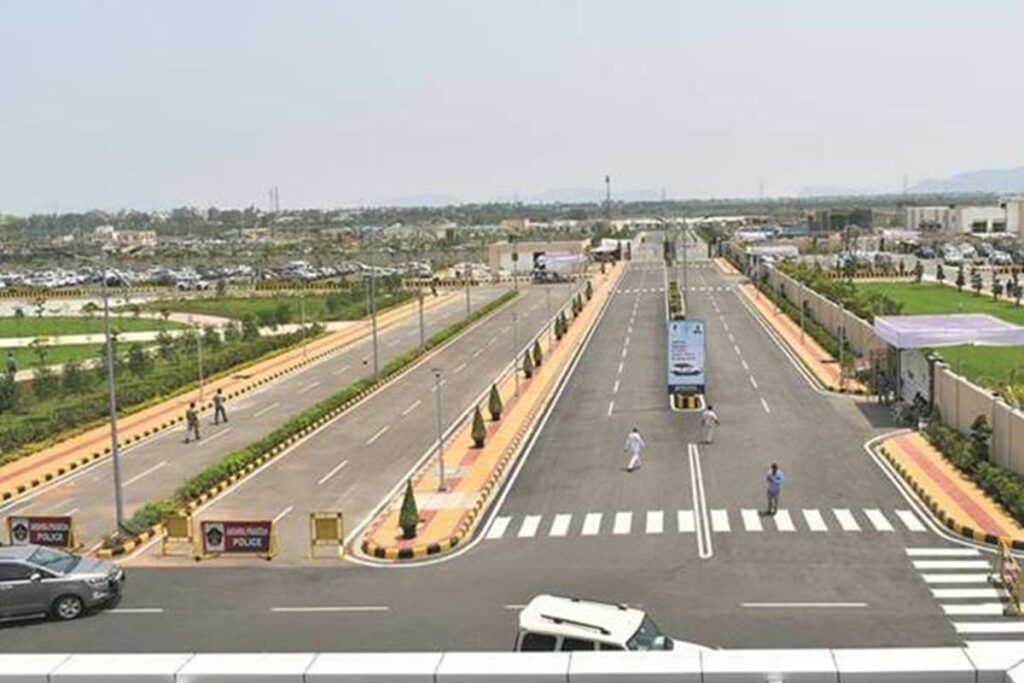 Andhra Pradesh’s capital city, Amaravati, has been a loser post Covid-19 pandemic. With many companies and industries pulling out their investments from China, following allegations of being the manufacturer of Coronavirus which is ravaging all the nations in the world, Amaravati could have been the right option to invest the withdrawn money, had it already been established at least with partial infrastructure.
Andhra Pradesh’s capital city, Amaravati, has been a loser post Covid-19 pandemic. With many companies and industries pulling out their investments from China, following allegations of being the manufacturer of Coronavirus which is ravaging all the nations in the world, Amaravati could have been the right option to invest the withdrawn money, had it already been established at least with partial infrastructure.
Meanwhile, there are reports that Prime Minister Narendra Modi is discussing plans to benefit from the possible shift in the global supply chains, post the outbreak of Covid-19. The BJP government is looking at investors wanting to add manufacturing units outside China as the supply chain had suffered a setback after the outbreak of Coronavirus at the beginning of this year.
As part of reviving the economy, the Modi-led government is trying to woo global mobile handset makers, consumer durable companies by offering access to land, tax incentives and other necessary facilities.
Make in India
Under the “Make in India” initiative, Modi’s government offered incentives to foreign companies to open factories. The advantage of India is its working-age population which is projected to top 1 billion by 2050. However, the advantage of abundant and cheap labour are being shadowed by inadequate infrastructure, outdated land and labour regulations and bureaucratic lethargy.
Two days ago, India launched a plan to offer incentives of nearly $7 billion and recruit five big international companies manufacturing mobile phones and related components, like electronic components, semiconductors and other parts. Electronic manufacturing clusters will be provided with
ready-to-use facilities.
Once these investments come, Modi would be redirecting them to states which are ready to make some offers from their part. States ready to provide large area of land, other facilities like adequate supply of electricity, water, transportation of goods and others would be picked to set up these units.
Focus on development
Andhra Pradesh could have been the right choice for the investors had Amaravati been developed on the lines as pronounced by the TD leaders during their regime. After bifurcation, the Telugu Desam government focused on improving the revenue of AP and focused on bringing investments and companies to the state. With TD supremo N. Chandrababu Naidu as the Chief Minister for five years after 2014, many national and international companies thronged AP to open their shops in the state. The TD government also paid keen attention to providing land, tax incentives and other infrastructure like 24×7 electricity for the factories to ensure improved production and above all, streamlined clearances from all the departments to increase the Ease of Doing Business index.
Impressed by the vision and leadership of Naidu-led government, many companies like Lulu, Foxcon, Celkon, Honda Motors, Isuzu showed interest in opening their units in the state, which also boasted of constructing a world-class capital at Amaravati, by pooling as much as 33,000 acres from farmers.
In return, the government promised land elsewhere and also agreed to pay compensation to them for the loss towards crops which they are not able to cultivate due to the construction works taken up on their land.
Change in guard
However, the whole scene has changed after the YSRC government was voted to power in 2019 with a thumping majority of 152 seats out of the total 175 seats in the Assembly.
Chief Minister Jagan Mohan Reddy had different priorities and plans chalked out for the state. He shifted the focus to welfare programmes and introduced Navaratnalu aimed at benefiting various sections in the society like SHG women, poor students, unemployed youth, fisher folk, auto and cab drivers, etc. He aimed at welfare of the people but not development of the state. There is criticism against the YSRC government that the CM is only focusing on vote bank politics but not development. Political analysts say that welfare alone cannot help any state to survive for long.
The YSRC government reportedly took an overdraft of Rs 80,000 crore in the last one year which means the state is being pushed into deep financial crisis, say economic experts. The opposition parties have been criticising the ruling YSRC government for failing to get at least investment or company to the state.
Shift the capital
In addition, the CM also announced that he wanted to shift the capital to Vizag which only added to existing confusion in the state following ‘reverse tendering’ and review of power purchase agreements (PPAs) with which the YSRC government went ahead despite being warned by the Centre not to go ahead in that direction.
Other contenders
Meanwhile, neighbouring Telangana, which already has a well-established capital, Hyderabad, tried to benefit from the situation. K.T. Rama Rao, Telangana IT minister and son of TS Chief Minister K. Chandrasekhar Rao, lured the investors by showing them land available in abundance and other infrastructure. Global giants Amazon and Google set up one of their largest campuses in Hyderabad even while AP was mired in confusion over the location of the capital. He put in his best efforts to benefit from the readymade capital.
In the prevailing conditions, Tamil Nadu also tried to bag some investments and there was buzz that KIA Motors which established its $1.1 billion unit near Anantapur in 2017 during the TD regime was planning to move its base to that state due to the change in the policies of AP in connection with hiring locals and review of incentives given by the previous TD government, when it was set up. However, KIA authorities gave a clarification that they have no plans to shift the unit already existing in Anantapur.
One chance
Post the pandemic, it would be better if Jagan Mohan Reddy could use the ‘one chance’ given to him and focus on making AP an investment hub by focusing on improving the facilities and infrastructure in Vizag, which is already a port city. Jagan should try to exploit all the advantages associated with it, feel political observers.

























